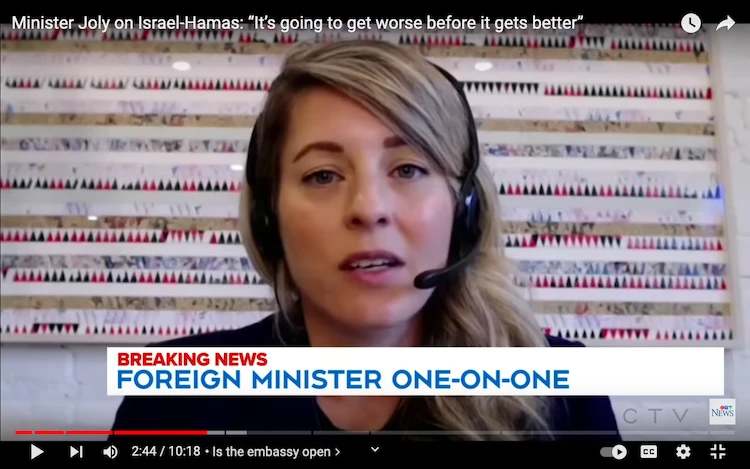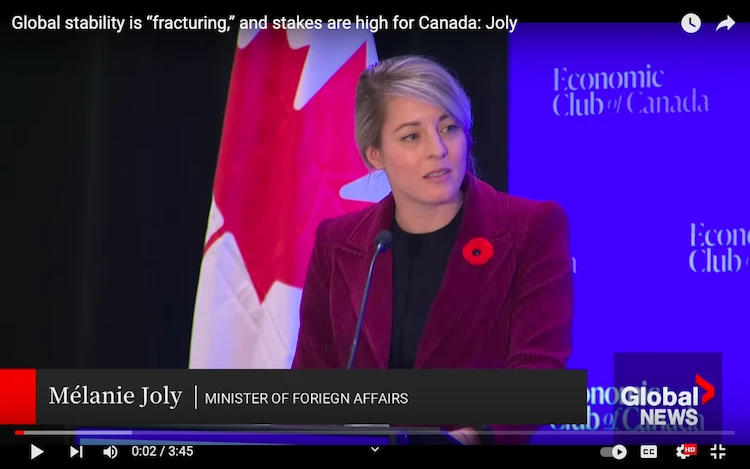Video: Joly on Israel-Hamas: It’s going to get worse before it gets better

@skillsgaptrainer “This is the first video that we saw on our YouTube feed relating to Minister Melanie Joly. Sharing our initial insights might be a double-edged sword; we fear that we might regret offering useful information to the Liberal Party — a party that, in our view, hasn’t always merited such consultation. But for transparency’s sake, here are our thoughts: Minister Joly comes across as moderate, clear and centered, a stark contrast to the leadership of the Liberal Party and even the Prime Minister. Further, her peace-seeking nature and collaborative nature, could lend itself to greater geopolitical connectedness between Canada and other countries, not as much isolation as currently exists for Canada. Perhaps if there were more peace-seeking politicians like Minister Joly, Canada would have a greater chance of achieving more of a neutral stance when it comes to funding or participating in global conflict areas. The Liberal Party would do well to consider her for leadership; she could be the transformative voice they need and it would be a way to amend the emotional damage done to the working class via the selection of the current leader set. It’s puzzling that the Liberal Party, in its current state, boasts someone like her, who seems more aligned with the Conservative Party’s principles, legal principles, professional abilities and analytical grounding. While the Liberals may not currently deserve such a rational individual in their midst, they have one. Kudos to Minister Joly for her commendable and rational performance in the interview. If Canada faces the challenges discussed in this video and the Liberal Party is still in charge, it would be wise for them to lean more on reasoned, and neutral individuals like her, and it would be far safer for most Canadians to have someone fair and well balanced at the helm. This is merely an initial perception or impression from this video. However, this suggestion is only a making the best case out of a bad situation type of recommendation. Obviously, in these times, what Canada needs to actually solve the problems, not to simply live with problems, is a Conservative majority, and Minister Joly should try out being a Conservative one day.“
@skillsgaptrainer @janerichards3868 “Hardship forges the character of leaders that can resolve difficult situations and achieve great progress. There may not be too much hardship presented in this video, and so the leadership achievements may not materialize in the long run :(.“
@skillsgaptrainer @janerichards3868 “Title: Leadership in a Divided Age: The Ethical Awakening
In our ever-evolving world, there’s an evident lapse in ethical leadership across varied domains — be it the corridors of tech giants, political amphitheatres, or academic halls. And the implications are wide-reaching.
Take, for instance, the custodians of the digital realm — social media platforms and tech conglomerates. The rise and proliferation of ‘cancel culture’ and the diminishing sanctity of free speech have been disturbing trends. What led to these digital overlords permitting, even indirectly fostering, such a culture? Didn’t they used to be tech visionaries during the 20th century? Furthermore, in academia, the repercussions for deviating from prescribed curriculum’s are disproportionately severe. Why is there a seeming ideological barrier in certain professions, where leaning conservative feels like a professional liability? The question remains: Why should one’s philosophical and political convictions determine job or networking opportunities? It often seems that the HR recruiters in BC need to know your political leanings, and where you’re from, in order to evaluate your tech competencies. Very strange indeed. It often feels like the best way to get a job is to covertly and accidentally reveal your political opinions or your demographic information.
Such issues underscore a broader, more universal problem. All too often, professionals who demonstrate competency, independent thought, leadership potential, and diverse skills are sidelined or suppressed. This has been the case in BC for many graduates of post-secondary programs post 2004. Instead, a pervasive ‘follow the leader’ mentality flourishes, favouring those who simply nod and echo the established narrative. In fact, the most successful people in BC Public Service are those that have the highest restraint of engaging in conversation during public meetings or at work altogether. From tech enterprises to the military and government, this conformist culture systematically eliminates change-makers, the very individuals capable of steering our society toward the future we envision.
As we navigate the 21st century, it’s distressing to witness professionals reticent to stand up, to assert their values, largely because the echelons of power don’t champion these virtues. For change to take root, it must begin at the top. Our vote, our voice, shouldn’t just favour superficial appeal but recognize and elevate leaders forged through trials, resilience, and ethical integrity.
Tech CEOs, especially, have an unprecedented responsibility. They should not only foster a culture that encourages their workforce to stand against problematic legislation — like those promoting digital and journalistic censorship, or bolstering cancel culture — but they must also partner with the public. Mutual support — where we rally for digital speech rights and they gain our trust — can form a symbiotic relationship leading to collective advancement.
Consider luminaries like Jordan Peterson; their rise signifies a thirst for candid academic discourse. Imagine a world where scholars voice their opinions without the looming threat of career derailment. This shift could pave the way for a new age in corporate leadership and politics —where tech CEOs and politicians are shaped not merely by their peers at the top but are molded by society’s collective professional standards.
The path forward demands our leaders transcend mere profit and political optics. They must embrace a loftier vision, one anchored in morality and the greater good, guiding our society towards genuine progress. Good luck to the tech CEO’s to heed this message of going to war with overly restrictive censorship requirements and good luck to the public to control your impulses to get professionals fired or to try harder to select leaders based on philosophical fundamentals, technical fundamentals, character fundamentals, rather than the entertainment biases or appearance biases.”
Video: Israel news | Evacuation flights from Israel for Canadians to begin by weeks end: Joly
@skillsgaptrainer “The fact that she’s wearing a green jacket, shows a bit of boldness, and respect to conservative identity. Perhaps she deserves some credit for imagination and for reaching out to new audiences. When’s the last time Trudeau dressed up for Canadian military or hunters or sports shooters. That’ll be the day.“
Video: Global stability is “fracturing“, and stakes are high for Canada: Joly
@skillsgaptrainer “It’s heart breaking to see Liberal MPs, yes even Liberal MPs hurt so badly. Seriously, everyone is human, and despite the grand amount of suffering done to Canada by this party, there should be love in every Canadians heart with Liberal MPs are harmed so terribly by their leader. The lesson we are trying to say is, the worst tragedy of humanity can be say something like biodiversity loss of all animals, nuclear war potential, genocide, and the list is quite long. The unfortunate aspect of the Canadian story, is that though we don’t have that kind of tragedy, we still have something that is comparable. That comparable tragedy is when the leader fails the team. Sounds inocuous, but in the story of a modern civilization, that is truly a species level, or global level failure.“
@skillsgaptrainer “Title: “A Blueprint for Renewal: Embracing Minister Joly’s Approach for Liberal Party’s Revitalization”
Minister Joly’s recent address, as captured in this insightful video, is a testament to her capacity for professional sensemaking in a world rife with complexity. If this video is any indication, and should other addresses of hers echo this clarity, she adeptly navigates global issues with a focus on principles that resonate with Canadians from all walks of life. Her speech underlines a keen understanding of geopolitical shifts and a commitment to addressing the direct impact of these shifts on our daily lives, from rising grocery prices or rising inflation, to the need for international humanitarian law.
Her approach, grounded in the content of this video, showcases a refreshing blend of conservative discipline and conservative analytics, combined with liberal openness, setting a standard for what Canadians may seek in their political representatives. Joly demonstrates that one does not need to resort to divisiveness or untested futuristic theories of social behaviour shaping to address serious issues; instead, a more traditional 20th century communication style along with traditional values and traditional law prioritization may lead to policies that resonate on both a local and global scale with the people’s desires.
Adopting Joly’s neutral and considerate method of communication, along with her ability to prioritize issues according to importance and immediate relevance, as illustrated here, could indeed be the recalibration needed for the Liberal party, aligning it more closely with the foundational values of classical liberalism. By focusing on substantive issues and practical solutions rather than partisan politics, the party can present itself as a truly inclusive and problem-solving force. This could mend the perception that the party is out of touch with the needs of the average Canadian, working class, construction workers, farmers, truck drivers, mining workers, oil and gas workers, energy workers, engineering class or professionally designated STEM workers, property-minded individuals, public-safety minded individuals such as sports shooters, hunters, police or military; potentially helping significantly towards establishing the Liberal Party as a bastion for those who value thoughtful, principled leadership.
In essence, while Minister Joly’s own electoral prospects as a leader remain speculative, especially due to the severe difficulty in challenging a seasoned expert such as Pierre Poilievre, one of the toughest Conservative Party leaders that have existed in our recent memory. Her style of governance, as depicted in this video, could serve as a blueprint for the Liberal party’s rejuvenation. It’s about taking cues from her emphasis on dignity, authenticity, threat prioritization, global perception realism and pragmatism, respect for all people regardless of group size, neutral diplomacy, professional sense making, law, personal security, property security, national security and economic stability, and embedding these into the party’s ethos. If the Liberals can pivot in this direction, embodying these values sincerely, they could reforge a strong connection with Canadians, catering to the public’s desire for integrity, rights, security, realism, relatability in politics, and re-establishing loyalty towards citizens and the public interest at the local level. Congratulations to Minister Joly for demonstrating your leadership method to Liberal Party. It is great to see.”
@fredrahm5495 “Yes, the stakes are high for Canada. Unfortunately, we have an unserious government in charge who will raise the stakes instead of managing them.“
@skillsgaptrainer @saltymcnaulty9927 “As one of the Skills Gap Trainers, I’ve watched two or three very brief YouTube video clips of Melanie Joly and I’ve got to say, I suspect she would be better for Liberal Party leadership than the current leader set. Everyone’s clamouring for leadership that’s not just competent but also visionary, but in terms of the Liberal Party situation, that would be like expecting a baby that has not learned to take a step to basically drive and win against professional world class F1 race car drivers or astronauts flying a jet, or expecting a grade school drop-out to pass the doctors final to become a Medical Doctor. We’re talking about orders of magnitude differences in capability descriptions here. People just don’t understand just how vast a difference a beginner who doesn’t have a skill, to a professional world class competitor is, not until you attain that status do you actually realize the difference. The reality is, you can’t leap into a sprint without first learning to crawl, without being able to walk at all. What I’m seeing in Joly is someone who, unlike the current leadership, could make professional decisions, under certain circumstances, decisions that don’t degrade our quality of life, our legal framework, our safety, and our technological edge, our future.
Not often can one person turn the tides amid chaos alone. It’s like expecting a single network node to power an entire system. It doesn’t work that way. That’s an illusion pushed on us to internalize failure when no one has supported us in the journey of life. To make people believe that every failure in life is their own fault, every crime in the world is the individuals fault, to never consider also the effects of the environment on individual nodes. The “network effect is real”, as we all learned with “gold physical trading network” or “bitcoin network”, and its strength comes from the collective capabilities and knowledge of individual contributing nodes. Imagine Joly, on an actual professional multidisciplinary team like the one the Conservatives MP’s have; that’s where her potential could really take flight.
A leader is only as good as the team that surrounds them — put Joly in a professional network of sharp, inventive, and skilled professionals, and after a few years, I bet we’d see a leader who can truly make a difference. Remember, even the most capable individuals can falter if they’re isolated, unsupported, without resources, misinformed or deceived. It’s all about the synergy of the team, and the backup the team offers to help shape public understanding, team product and service delivery. Perhaps, with the exception of AI, in most instances in life you need a team. With AI, perhaps your team is a digital one, but it’s still a team. Perhaps we should try to judge the person, and their team, and then we can understand what really is going on as to why things work or why they do not, and what their real potential and capabilities are – individual analysis and environment analysis (outside world or outside related nodes), combined as one analysis.“
Related books and resources:
“Leadership in Turbulent Times” by Doris Kearns Goodwin: This book provides an in-depth look at the leadership qualities of four U.S. presidents who faced considerable challenges during their terms. It offers a perspective on how leaders can emerge and navigate through crises. “Diplomacy” by Henry Kissinger: A classic text on international relations and diplomacy, offering insights into the complexities of global politics and the intricacies of diplomatic engagement. “On Grand Strategy” by John Lewis Gaddis: Explores the strategic thinking required to lead nations through complex international landscapes, relevant to discussions on geopolitical strategy. “Political Tribes: Group Instinct and the Fate of Nations” by Amy Chua: This book delves into the role of tribalism in politics and how it affects decision-making and national unity, which is pertinent to discussions on national and party leadership. “The Room Where It Happened: A White House Memoir” by John Bolton: Offers an insider’s perspective on the workings of international diplomacy and political decision-making within the context of U.S. foreign policy. “The Square and the Tower: Networks and Power, from the Freemasons to Facebook” by Niall Ferguson: Looks at how networks have influenced history and politics, relevant to discussions on political connections and leadership. “The Prince” by Niccolò Machiavelli: A seminal work on political strategy and power dynamics, providing insights that may be applied to discussions about political leadership and ethics. “The New Leadership Literacies: Thriving in a Future of Extreme Disruption and Distributed Everything” by Bob Johansen: Offers perspectives on the future of leadership and the skills needed to navigate the increasing complexity and disruption in the modern world. “Leadership: Theory and Practice” by Peter G. Northouse: Provides a comprehensive overview of various leadership theories and practices, applicable to discussions on political leadership. “The Art of War” by Sun Tzu: While traditionally a military strategy book, its principles can be applied to leadership and strategy in various contexts, including politics.



@7966016 “She is embarrassing, can this Liberal government be anymore unqualified?“